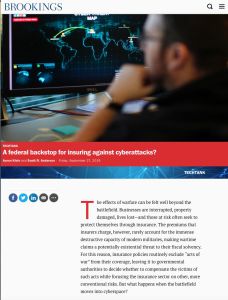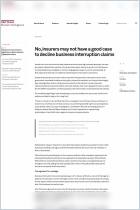Únase a getAbstract para acceder al resumen.

Únase a getAbstract para acceder al resumen.
Aaron Klein and Scott R. Anderson
A Federal Backstop for Insuring Against Cyberattacks?
Brookings Institution, 2019
¿De qué se trata?
As cyberwarfare evolves, so does insurers’ coverage for damages.
Recommendation
Technology is challenging insurers’ long-held notions about coverage, as cyberspace increasingly becomes the locus of liability. Insurance companies have excluded coverage for losses due to “acts of war” for more than 100 years. But conflicts between nations and attacks by terrorists have moved online, threatening commercial interests and the insurance industry’s long-term solvency. This thought-provoking exploration of sector challenges from experts Aaron Klein and Scott R. Anderson offers important considerations for state officials and financial executives.
Summary
About the Authors
Aaron Klein and Scott R. Anderson are fellows at the Brookings Institution.



























Comment on this summary